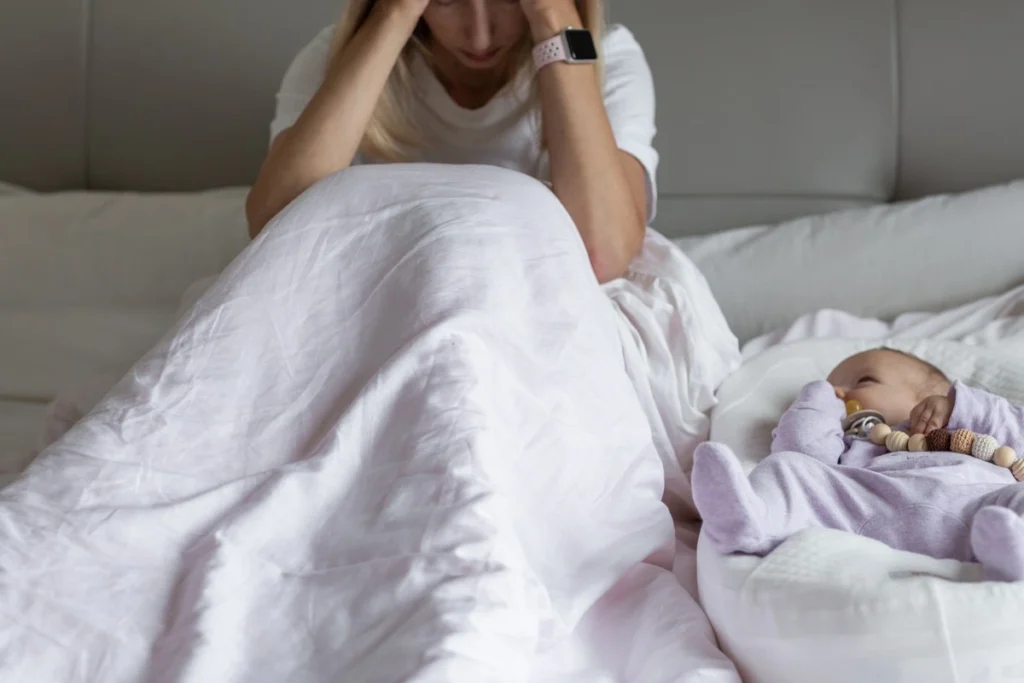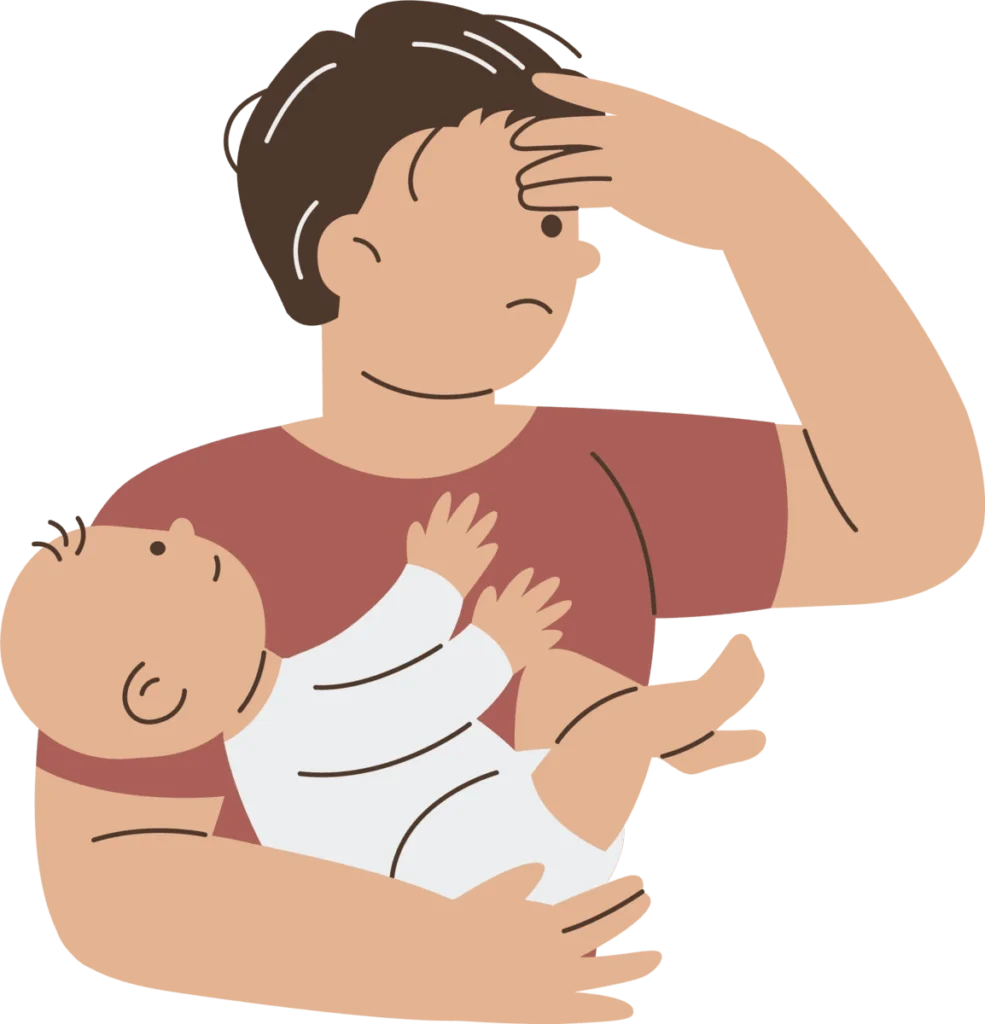
If you’re feeling unusually sad, overwhelmed, or disconnected after having a baby, you’re not alone.
Feeling off since giving birth? If you’re in Southern California and looking for answers, our women’s mental health specialists in Orange County are here to help—without judgment, just support.
Reach out to us today. Many women experience mood changes after childbirth, but when these feelings persist or worsen, it might be more than just the “baby blues.” This could be a sign of postpartum depression (PPD). At Anchored Tides Recovery, we believe that mental health support is just as essential as physical recovery after birth. You’re not weak for needing help—you’re human.
What Is Postpartum Depression?
Postpartum depression is a serious but treatable mental health condition that affects women after childbirth. It’s more intense and longer-lasting than typical baby blues, which usually fade within two weeks. PPD can interfere with your ability to care for your baby and yourself.
When Does Postpartum Depression Start?
PPD can begin anywhere from a few days to several months after giving birth. It most commonly starts within the first few weeks postpartum, but some women don’t experience symptoms until later in the first year.
Signs and Symptoms of Postpartum Depression
Wondering how to know if you have postpartum depression? Common signs include:
- Persistent sadness or crying
- Extreme fatigue or lack of energy
- Difficulty bonding with your baby
- Feelings of worthlessness, guilt, or hopelessness
- Loss of interest in things you used to enjoy
- Anxiety or panic attacks
- Difficulty sleeping (even when the baby sleeps)
- Changes in appetite
- Thoughts of harming yourself or your baby (seek help immediately if you experience this)
If you’re searching “what are the symptoms of postpartum depression,” these are the red flags to watch for.
Postpartum Depression vs. Baby Blues
The baby blues are common, affecting up to 80% of new moms. They include mood swings, irritability, and weepiness but usually go away within two weeks. PPD is more severe, lasts longer, and needs professional support to resolve.
What Causes Postpartum Depression?
There isn’t a single cause of PPD. Instead, it’s often a mix of:
- Hormonal changes (a sharp drop in estrogen and progesterone)
- Sleep deprivation
- Emotional factors (identity shifts, feeling overwhelmed)
- History of depression or anxiety
- Lack of support system
Postpartum Depression and Anxiety
PPD and postpartum anxiety often go hand in hand. Some women experience intense worry, racing thoughts, or physical symptoms like a rapid heartbeat. You might be constantly asking, “Am I doing everything wrong?” or feeling terrified something bad will happen.

Can Men Get Postpartum Depression?
Surprisingly, yes. Men can experience PPD, too. While less common, fathers may struggle with feelings of isolation, stress, and sadness after a baby is born. Supporting dads is just as important for the well-being of the entire family.
How Long Does Postpartum Depression Last?
If untreated, PPD can last for months or even longer. With the right care, many people start to feel better within weeks to months. Early intervention leads to quicker recovery.
How to Treat Postpartum Depression
Treatment depends on the severity of your symptoms. Common options include:
- Therapy: Speaking with a postpartum depression therapist near you can help you process emotions and build coping strategies.
- Support groups: Connecting with others going through the same thing can ease isolation.
- Medication: Antidepressants may be prescribed, especially if symptoms are moderate to severe.
- Holistic options: Nutritional support, gentle exercise, and mindfulness practices.
At Anchored Tides Recovery, we offer postpartum depression treatment in Orange County designed with women’s mental health in mind.
How to Prevent Postpartum Depression
While it can’t always be prevented, there are steps you can take:
- Create a postpartum support plan
- Ask for help—don’t wait until you’re overwhelmed
- Get as much rest as possible
- Prioritize healthy meals and hydration
- Stay connected with loved ones or support groups
- Talk to a therapist during pregnancy if you have a history of depression or anxiety
Can You Have Postpartum Depression After a Miscarriage?
Yes. Postpartum depression after a miscarriage is real and valid. The hormonal and emotional toll of pregnancy loss can trigger symptoms similar to PPD. Healing from miscarriage involves both physical and emotional care.
When to Seek Help: Listening to Your Inner Voice
If you’ve been feeling off, overwhelmed, or not like yourself, it’s worth paying attention. You don’t have to wait until things get worse to reach out for support. Sometimes just acknowledging, “Something doesn’t feel right,” is the first step toward healing.
Here are some common questions we hear from women just like you:
- “How can I tell if this is postpartum depression or just baby blues?”
- “Is there a natural way to treat postpartum depression?”
- “Where can I find a postpartum therapist near me?”
Trust your instincts. If you’re wondering whether you need help, it’s okay to ask for it. You’re not alone, and you don’t have to navigate this on your own.
Postpartum Depression vs. Baby Blues
The baby blues are common, affecting up to 80% of new moms. They include mood swings, irritability, and weepiness but usually go away within two weeks. PPD is more severe, lasts longer, and needs professional support to resolve.
Postpartum Depression Treatment Near You
You deserve support that understands your unique journey. At Anchored Tides Recovery, we offer postpartum depression treatment designed for women in Orange County and the greater Southern California area. Whether you’re a new mom in Huntington Beach, Irvine, or nearby, we’re here for you.
Find local support today. Whether you’re a first-time mom or navigating postpartum depression after miscarriage, we’re here for you.
Ready to talk? Need someone to talk to now? Speak with a therapist who understands postpartum depression—right here in Orange County.
📞 Call us at 866-329-6639 or send a confidential message. Healing starts with one step—we’ll walk with you the rest of the way.































